Portal:England/Selected biography/Archive
2009[edit]
January[edit]
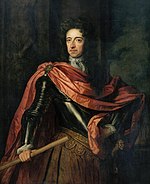
William III of England and Ireland, William II of Scotland or William of Orange (14 November 1650 – 8 March 1702) was the Prince of Orange from birth, Stadtholder of the main provinces of the Dutch Republic from 1672 onwards, and King of England, Scotland, and Ireland from 1689. Born a member of the House of Orange-Nassau, William won the English, Scottish and Irish crowns following the Glorious Revolution, in which his uncle and father-in-law, James II, was deposed. In England, Scotland and Ireland, William ruled jointly with his wife, Mary II, until her death on 28 December 1694. He reigned as 'William II' in Scotland, and 'William III' in England and Ireland. He is informally known in Northern Ireland and Scotland as "King Billy".
A Protestant, William participated in several wars against the powerful Catholic King Louis XIV of France in coalition with Protestant and Catholic powers in Europe. Many Protestants heralded him as a champion of their faith. Largely due to that reputation, William was able to take the British crowns where many were fearful of a revival of Catholicism under James. William's victory over James II at the Battle of the Boyne in 1690 is commemorated by the Orange Institution in Northern Ireland to this day. His reign marked the beginning of the transition from the personal rule of the Stuarts to the more Parliament-centered rule of the House of Hanover.
2008[edit]
December[edit]
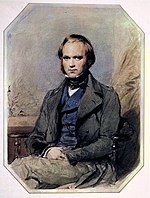
Charles Robert Darwin (12 February 1809 – 19 April 1882) was an English naturalist, who realised and demonstrated that all species of life have evolved over time from common ancestors through the process he called natural selection. The fact that evolution occurs became accepted by the scientific community and the general public in his lifetime, while his theory of natural selection came to be widely seen as the primary explanation of the process of evolution in the 1930s, and now forms the basis of modern evolutionary theory. In modified form, Darwin’s scientific discovery remains the foundation of biology, as it provides a unifying logical explanation for the diversity of life.
Darwin developed his interest in natural history while studying medicine at Edinburgh University, then theology at Cambridge. His five-year voyage on the Beagle established him as an eminent geologist whose observations and theories supported Charles Lyell’s uniformitarian ideas, and publication of his journal of the voyage made him famous as a popular author. Puzzled by the geographical distribution of wildlife and fossils he collected on the voyage, Darwin investigated the transmutation of species and conceived his theory of natural selection in 1838. Although he discussed his ideas with several naturalists, he needed time for extensive research and his geological work had priority. He was writing up his theory in 1858 when Alfred Russel Wallace sent him an essay which described the same idea, prompting immediate joint publication of both of their theories.
His 1859 book On the Origin of Species established evolution by common descent as the dominant scientific explanation of diversification in nature. He examined human evolution and sexual selection in The Descent of Man, and Selection in Relation to Sex, followed by The Expression of the Emotions in Man and Animals. His research on plants was published in a series of books, and in his final book, he examined earthworms and their effect on soil. In recognition of Darwin’s pre-eminence, he was one of only five 19th century UK non-royal personages to be honoured by a state funeral, and was buried in Westminster Abbey, close to John Herschel and Isaac Newton.
November[edit]
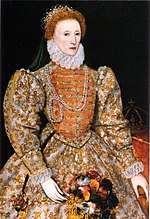
Elizabeth I (7 September 1533 – 24 March 1603) was Queen of England and Queen of Ireland from 17 November 1558 until her death. Sometimes called The Virgin Queen, Gloriana, or Good Queen Bess, Elizabeth was the fifth and last monarch of the Tudor dynasty. The daughter of Henry VIII, she was born a princess, but her mother, Anne Boleyn, was executed three years after her birth, and Elizabeth was declared illegitimate. Her brother, Edward VI, cut her out of the succession. His will, however, was set aside, and in 1558 Elizabeth succeeded her half-sister, the Catholic Mary, during whose reign she had been imprisoned for nearly a year on suspicion of supporting Protestant rebels.
Elizabeth set out to rule by good counsel, and she depended heavily on a group of trusted advisers led by William Cecil, Baron Burghley. One of her first moves as queen was to support the establishment of an English Protestant church, of which she became the Supreme Governor. This Elizabethan Religious Settlement held firm throughout her reign and later evolved into today's Church of England. It was expected that Elizabeth would marry, but despite several petitions from parliament, she never did. The reasons for this choice are unknown, and they have been much debated. As she grew older, Elizabeth became famous for her virginity, and a cult grew up around her which was celebrated in the portraits, pageants and literature of the day.
In government, Elizabeth was more moderate than her father and siblings. One of her mottoes was video et taceo: "I see, and say nothing". This strategy, viewed with impatience by her counsellors, often saved her from political and marital misalliances. Though Elizabeth was cautious in foreign affairs and only half-heartedly supported a number of ineffective, poorly resourced military campaigns in the Netherlands, France and Ireland, the defeat of the Spanish armada in 1588 associated her name forever with what is popularly viewed as one of the greatest victories in English history. Within 20 years of her death, she was being celebrated as the ruler of a golden age, an image that retains its hold on the English people. Elizabeth's reign is known as the Elizabethan era, famous above all for the flourishing of English drama, led by playwrights such as William Shakespeare and Christopher Marlowe, and for the seafaring prowess of English adventurers such as Francis Drake and John Hawkins.
Historians, however, tend to be more cautious in their assessment. They often depict Elizabeth as a short-tempered, sometimes indecisive ruler, who enjoyed more than her share of luck. Towards the end of her reign, a series of economic and military problems weakened her popularity to the point where many of her subjects were relieved at her death. Elizabeth is, however, acknowledged as a charismatic performer and a dogged survivor, in an age when government was ramshackle and limited and when monarchs in neighbouring countries faced internal problems that jeopardised their thrones. Such was the case with Elizabeth's rival, Mary, Queen of Scots, whom she imprisoned in 1568 and eventually had executed in 1587. After the short reigns of Elizabeth's brother and sister, her 44 years on the throne provided valuable stability for the kingdom and helped forge a sense of national identity.
October[edit]
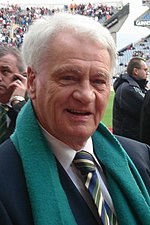
Sir Robert William Robson Kt CBE (born 18 February 1933), commonly known as Sir Bobby Robson (/ˈbɒbi ˈrɒbsən/), is a former international football player and former manager of several European clubs and the England national football team.
His professional playing career as an inside-forward spanned nearly 20 years, during which he played for just three clubs – Fulham, West Bromwich Albion and briefly for the defunct Vancouver Royals. He also made 20 appearances for England, scoring four goals.
He is now better known for his success as both a club and international manager, having won league championships in both the Netherlands and Portugal, earning trophies in England and Spain, and taking England to the semi-final of the 1990 World Cup. He was most recently a mentor to the manager of the Irish national football team.
Robson was created a Knight Bachelor in 2002, is a member of the English Football Hall of Fame and is the honorary president of Ipswich Town. He has, since 1991, had recurrent medical problems with cancer, and in August 2008, he admitted defeat to lung cancer. He stated "My condition is described as static and has not altered since my last bout of chemotherapy...I am going to die sooner rather than later. But then everyone has to go sometime and I have enjoyed every minute".
September[edit]
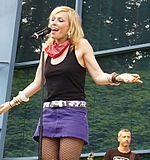
Natasha Anne Bedingfield (26 November 1981) is an English pop singer and songwriter. Based in Book St., London, Bedingfield debuted in the 1990s as a member of the Christian dance/electronic group The DNA Algorithm with her siblings Daniel Bedingfield and Nikola Rachelle. Throughout the 1990s and early 2000s, Bedingfield recorded rock and gospel songs for the Hillsong London Church, while Daniel Bedingfield went on to enjoy success with hits “Gotta Get Thru This” and “If You're Not The One”.
Natasha and Daniel share the Guinness World Record for being the only siblings to have had solo number-ones in UK chart history. Similarly, they have each cracked the Top 10 in Australia, United States, Canada and Europe. Bedingfield recorded her first album Unwritten in 2004. The album contained primarily uptempo pop songs and was influenced by R&B music; it enjoyed international success with over 2.5 million sold worldwide. In 2007, she received a Grammy Award nomination for "Best Female Pop Vocal Performance" for the song "Unwritten". Bedingfield's second album N.B. (2007) yielded the singles "I Wanna Have Your Babies" which was written and produced by Natasha Bedingfield, Wayne Wilkins, Andrew Frampton, and Steve Kipner, "Soulmate" and "Say It Again". Bedingfield has achieved 5 top ten singles in the United Kingdom to date and as of April 2008, she has sold over 10 million singles and albums worldwide. Bedingfield has promoted humanitarian causes throughout the world, and is noted for her work with children in the "Stop the Traffik" campaign through her mother's charity, Global Angels. While she is not politically outspoken in the US, her song "Unwritten" has been used by Barack Obama on the campaign trail in 2008.
August[edit]

Mary Shelley (née Mary Wollstonecraft Godwin; 30 August 1797 – 1 February 1851) was an English novelist, short story writer, dramatist, essayist, biographer, and travel writer, best known for her Gothic novel Frankenstein: or, The Modern Prometheus (1818). She also edited and promoted the works of her husband, the Romantic poet and philosopher Percy Bysshe Shelley. Her father was the political philosopher William Godwin, and her mother was the philosopher and feminist Mary Wollstonecraft.
After Mary Godwin's mother died giving birth to her, she and her older half-sister, Fanny Imlay, were raised by her father. When Mary was three, Godwin married his neighbour, Mary Jane Clairmont. Godwin provided his daughter with a rich, if informal, education, encouraging her to adhere to his liberal political theories. In 1814, Mary Godwin fell in love with one of her father’s political followers, the married Percy Bysshe Shelley. Together with Mary's stepsister, Claire Clairmont, they left for France and travelled through Europe; upon their return to England, Mary was pregnant. Over the next two years, she and Percy faced ostracism, constant debt, and the death of their prematurely born daughter. They married in late 1816 after the suicide of Percy Shelley's first wife, Harriet.
July[edit]

William Shakespeare baptised 26 April 1564 – 23 April 1616) was an English poet and playwright, widely regarded as the greatest writer in the English language and the world's pre-eminent dramatist. He is often called England's national poet and the "Bard of Avon" (or simply "The Bard"). His surviving works consist of 38 plays,[b] 154 sonnets, two long narrative poems, and several other poems. His plays have been translated into every major living language, and are performed more often than those of any other playwright.
Shakespeare was born and raised in Stratford-upon-Avon. At the age of 18 he married Anne Hathaway, who bore him three children: Susanna, and twins Hamnet and Judith. Between 1585 and 1592 he began a successful career in London as an actor, writer, and part owner of the playing company the Lord Chamberlain's Men, later known as the King's Men. He appears to have retired to Stratford around 1613, where he died three years later. Few records of Shakespeare's private life survive, and there has been considerable speculation about such matters as his sexuality, religious beliefs, and whether the works attributed to him were written by others.
Shakespeare produced most of his known work between 1590 and 1613. His early plays were mainly comedies and histories, genres he raised to the peak of sophistication and artistry by the end of the sixteenth century. Next he wrote mainly tragedies until about 1608, including Hamlet, King Lear, and Macbeth, considered some of the finest examples in the English language. In his last phase, he wrote tragicomedies, also known as romances, and collaborated with other playwrights. Many of his plays were published in editions of varying quality and accuracy during his lifetime, and in 1623 two of his former theatrical colleagues published the First Folio, a collected edition of his dramatic works that included all but two of the plays now recognised as Shakespeare's.
Shakespeare was a respected poet and playwright in his own day, but his reputation did not rise to its present heights until the nineteenth century. The Romantics, in particular, acclaimed Shakespeare's genius, and the Victorians hero-worshipped Shakespeare with a reverence that George Bernard Shaw called "bardolatry".[1] In the twentieth century, his work was repeatedly adopted and rediscovered by new movements in scholarship and performance. His plays remain highly popular today and are consistently performed and reinterpreted in diverse cultural and political contexts throughout the world.
June[edit]
Portal:England/Selected biography/06 2008
May[edit]

Paul Adrien Maurice Dirac, OM, FRS (August 8, 1902 – October 20, 1984) was a British theoretical physicist and a founder of the field of quantum mechanics. Dirac made fundamental contributions to the early development of both quantum mechanics and quantum electrodynamics. He held the Lucasian Chair of Mathematics at the University of Cambridge and spent the last ten years of his life at Florida State University. Among other discoveries, he formulated the so-called Dirac equation, which describes the behavior of fermions and which led to the prediction of the existence of antimatter. Dirac shared the Nobel Prize in physics for 1933 with Erwin Schrödinger, "for the discovery of new productive forms of atomic theory.
April[edit]

Andrew ("Andy") Alexander Cole (born 15 October 1971 in Nottingham) is an English footballer, who is one of the highest scoring players in English football's history. He currently plays for Burnley (on loan from Sunderland). He is most well known by the name Andy Cole (which he was universally known as in the 1990s) but in 2000 he asked to be known as Andrew Cole. He is ranked second in the all time scoring charts of the FA Premier League. In his career Cole has scored a total of 188 Premier League goals, 2nd behind Alan Shearer who has 260 goals. Cole has the distinction of being one of the few players in England to have swept all possible honours in the English game, including the PFA Young Player of the Year award, as well as the coveted UEFA Champions League title. Cole was also capped fifteen times for England between 1995 and 2001, scoring once.
March[edit]
Robert Lindsay (born 13 December 1949 in Ilkeston) is an award-winning English actor, best known for his role as Ben Harper in the British television series My Family. Born in Ilkeston, Derbyshire, the son of Norman and Joyce Stevenson, after leaving school, Lindsay enrolled in the drama department of a technical college in Nottingham, and intended to become a drama teacher. However, friends at Nottingham Playhouse encouraged him to apply to RADA, and in 1968 he was accepted there with the aid of a government grant. After he graduated, he took a job as a dialect coach for a repertory company in Essex, and then joined a regional theatre group
Lindsay first came to prominence as the cockney layabout Jakey Smith in ITV comedy series Get Some In!, and was then given the starring role as incompetent revolutionary Wolfie Smith in the BBC sitcom Citizen Smith. He followed this with roles in a number of the BBC Television Shakespeare productions, including Benedick in Much Ado About Nothing, and as Edmund in King Lear opposite Lord Laurence Olivier in 1984. However it is notable he did take part in an obscure Radio 4 show, What Are You Talking About?, in the early 1980s between Television Shakespeare productions, in an attempt to establish a comedy career.
February[edit]
Edward I (17 June 1239 – 7 July 1307), popularly known as Longshanks, also as "Edward the Lawgiver" or "the English Justinian" because of his legal reforms, and as "Hammer of the Scots", achieved fame as the monarch who conquered Wales and tried to do the same to Scotland. He reigned from 1272 to 1307, ascending the throne of England on 20 November 1272 after the death of his father, King Henry III. At the time of the death of Henry III, Edward was on the Crusades. He was crowned on his return on 19 August 1274. His mother was queen consort Eleanor of Provence. He was voted the 92nd greatest Briton in the 2002 poll of 100 Greatest Britons.
Edward was born at the Palace of Westminster on the evening of 17 June 1239. He was an older brother of Beatrice of England, Margaret of England and Edmund Crouchback, 1st Earl of Lancaster. He was named after Edward the Confessor. From 1239 to 1246 Edward was in the care of Hugh Giffard (the son of Godfrey Giffard) and his wife, Sybil, who had been one of the midwives at Edward's birth. In 1255, Edward and Eleanor both returned to England. The chronicler Matthew Paris tells of a row between Edward and his father over Gascon affairs; Edward and Henry's policies continued to diverge, and on 9 September 1256, without his father's knowledge, Edward signed a treaty with Gaillard de Soler, the ruler of one of the Bordeaux factions. Edward's freedom to manoeuver was limited, however, since the seneschal of Gascony, Stephen Longespée, held Henry's authority in Gascony. Edward had been granted much other land, including Wales and Ireland, but for various reasons had less involvement in their administration.
January[edit]

William Shakespeare (born April 1564 — 23 April 1616) was an English poet, writer and playwright. Shakespeare is widely regarded as being the greatest writer of the English language during his time. Shakespeare was known to be a performer in 38 plays and 154 sonets during his career.
Shakespeare was born and raised in Stratford-upon-Avon, southern England. Although not factually verifiable, historians believe Shakespeare to have been educated at King's New School Shakespeare had three children: Sussana, Hamlet and Judith together with his wife, Anne Hathaway. In 1592, records of his play and performances were recorded. After 1606, Shakespeare began to write fewer plays and, by 1913, none where attributed to his name
On 23 April 1616 — Shakespeare died, he was survived by his wife and two daughters as Hamnet had died ages 11. The terms of his will entitled his eldest daughter, Susanna to inherit a large amount of his estate, and for it to be passed down to "the first son of her body". Two days after his death, Shakespeare was buried in the chancel of the Holy Trinity Church, a monument was built prior to 1623 in his memory on the north wall of the chancel.
2007[edit]
December[edit]

Margaret Thatcher is a retired British politician and the first female Prime Minister of the United Kingdom, a position she held from 1979 to 1990. She is a member of the Conservative Party and the figurehead of a political ideology known as Thatcherism. Even before coming to power she was nicknamed The Iron Lady in Soviet propaganda, an appellation which stuck. The changes she set in motion between coming to power and 1985 were profound, and altered much of the economic, cultural and commercial landscape of Britain and, by example, the world as a whole. Along the way she also aimed to roll back the welfare state, or "nanny state", as she termed it. Her popularity finally declined when she replaced the unpopular local government Rates tax with the even less popular Community Charge. At the same time the Conservative Party began to split over her sceptical approach to Economic and Monetary Union of the European Union. Her leadership was challenged from within and she was forced to resign in 1990, her loss at least partly due to inadequate advice and campaigning.
- ^ Bertolini, John Anthony (1993). Shaw and Other Playwrights. Pennsylvania: Pennsylvania State University Press, 119. ISBN 027100908X.
